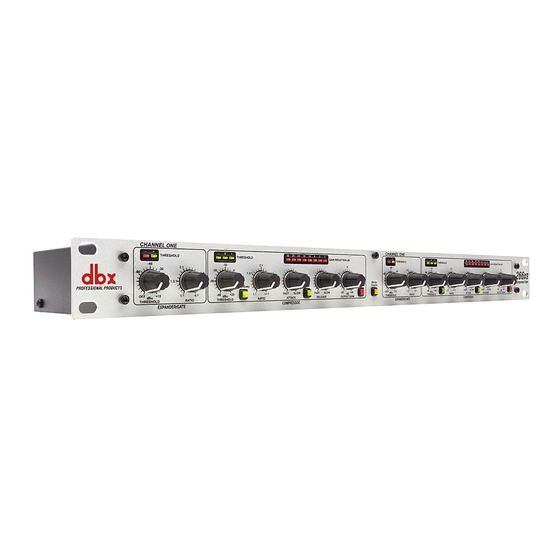dbx Detection and the Dynamics Duo Manual de Revisão - Página 5
Procurar online ou descarregar pdf Manual de Revisão para Hardware informático dbx Detection and the Dynamics Duo. dbx Detection and the Dynamics Duo 7 páginas.

locked together so that their gains change identically--otherwise, the stereo image will shift
to the side with less gain reduction occurring at that instant.
We agree that the VCA's must react identically when linked, but which detector controls
both VCA's? Do they react to the left channel detector, or to the right channel detector, or
both? And, if to both, how? Do they react to the greater of the two signals? Do they react to
the sum of the signals? At this point you're probably asking,"Who the @%&!*% cares?!"Well,
for starters, your ears and brain care. Bottom line: the detectors of both channels need to be
linked in an intelligent way. Let's take a look at some not-so-intelligent ways and, of course,
the dbx way.
5.The Sum Of The Squares Of The Average of the Hypotenuse Sounds Bad! (Or Why We Do
It The Way We Do!)
One way to do stereo linking is to ignore one of the channels, either the left one or the
right one, and have both VCA's react to the signal on that one channel only. So which
channel signal do you choose to pay attention to and which one do you ignore, allowing
damaging peaks, speaker overexcursions, or fatal jaunts into digital 0 VU land? If this seems
like a pointless question because no manufacturer would be stupid enough to implement
this method on a stereo processor, guess again. A particular manufacturer with a German-
sounding name whose boxes are made in China has implemented this method on their
"stereo" box. Hmm? Incidentally, their chosen method of detection on this box is the log
average method.
Another way to link detectors is to sum the left and right channel signals together before
going into one detector as suggested in an application note of a particular manufacturer of
another VCA. On the surface, this may seem like an acceptable way and will sometimes give
acceptable results, especially if the left and right signals are identical.The problem is that the
signals are, by definition, stereo! There is no problem detecting mono signals since they add
together without phase cancellation, but we're not processing mono signals when we're in
stereo link mode!
Stereo signals are, of course, different to some degree and will combine with some phase
cancellation. In other words, peaks in phase add together while peaks out of phase cancel.
Therefore, using this method, the detector will not calculate the correct level of the
¨
Detection and the Dynamics Duo - November 1998
Detection and the Dynamics Duo
Page 4
